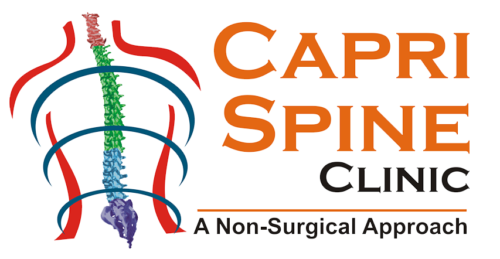Spinal Cord Injury Rehabilitation
Best Spine Treatment Without Surgery at Capri Spine
Spinal Cord Injuries
When there is any damage to the spinal cord of the body, it cause neurological deficits in the body and leads to loss of muscle and sensory power.
A spinal cord injury — damage to any part of the spinal cord or nerves at the end of the spinal canal — often causes permanent changes in strength, sensation and other body functions below the site of the injury. If you’ve recently experienced a spinal cord injury, it might seem like every aspect of your life will be affected.
Paralysis of the lower half of the body is called paraplegia. Paralysis below the neck, including both arms and legs, is called quadriplegia.
Your ability to control your limbs after spinal cord injury depends on two factors: the place of the injury along your spinal cord and the severity of injury to the spinal cord. The lowest normal part of your spinal cord is l cord is referred to as the neurological level of your injury. The severity of the injury is often called “the completeness” and is classified as either:
- Complete. If almost all feeling (sensory) and all ability to control movement (motor function) are lost below the spinal cord injury, your injury is called complete.
- Incomplete. If you have some motor or sensory function below the affected area, your injury is called incomplete.
There are varying degrees of incomplete injury.
Additionally, paralysis from a spinal cord injury may be referred to as:
- Tetraplegia or quadriplegia. This means your arms, hands, trunk, legs and pelvic organs are all affected by your spinal cord injury.
- Paraplegia. This paralysis affects all or part of the trunk, legs and pelvic organs.
- Your health care team will perform a series of tests to determine the neurological level and completeness of your injury.
- Spinal cord injuries of any kind may result in one or more of the following signs and symptoms:
- Loss of movement
- Loss of sensation, including the ability to feel heat, cold and touch
- Loss of bowel or bladder control
- Exaggerated reflex activities or spasms
- Changes in sexual function, sexual sensitivity and fertility
- Pain or an intense stinging sensation caused by damage to the nerve fibers in your spinal cord
- Difficulty breathing, coughing or clearing secretions from your lungs
SPINAL CORD INJURY REHABILITATION
Physiotherapists are health professionals who assess the neurological and musculoskeletal systems in order to design a therapy program aimed to maximize an individual’s level of physical functioning post spinal cord injury.
The goals of physiotherapy include:
- Maintenance of a clear chest – for the prevention of chest infections and promotion of well being.
- Maintenance of limb range of movement, involving passive movements of paralyzed limbs, and active exercise of non-paralyzed limbs.
- Strengthening of active muscle groups.
- Achievement of functional mobility depending on your level and degree of injury.
- ‘Functional mobility’ refers to a range of skills, including;
- control of balance and maintenance of good posture getting in and out of bed
- moving around in the bed
- getting in and out of the shower and toilet
- getting in and out of a car
- getting on and off the floor if applicable
- walking if applicable
- Training of family members and carers to assist with your care, both throughout your rehabilitation and after discharge as appropriate

